The Best Flat Irons and Hair Straighteners of 2021
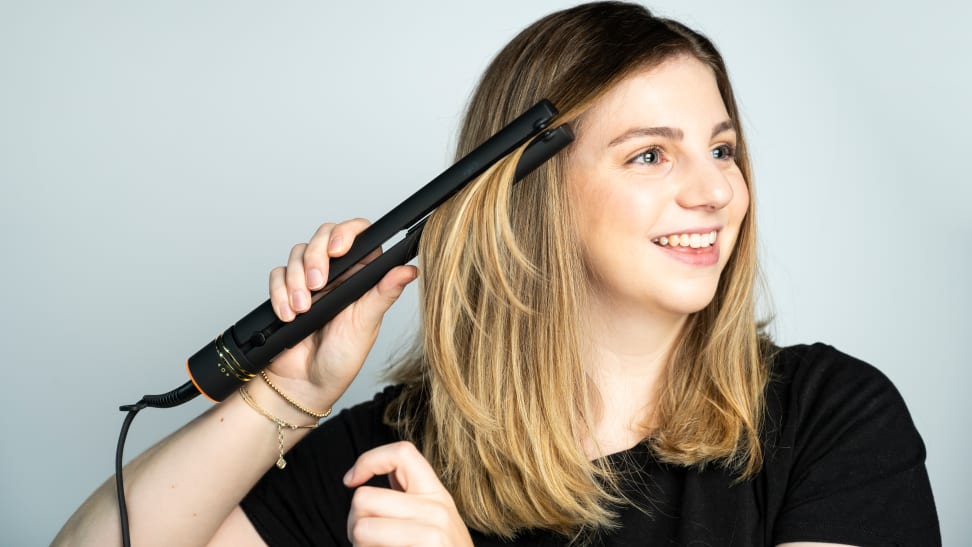 — Recommendations are independently chosen by Reviewed’s editors. Purchases you make through our links may earn us a commission.
— Recommendations are independently chosen by Reviewed’s editors. Purchases you make through our links may earn us a commission.Whether you have naturally straight hair that you run a flat iron through post-blowdry to tame flyaways or you have curls you like to change up with a straight ‘do, you need a trusty straightener.
To find the right tool for smooth, sleek locks, we tested a dozen of the most popular and highly rated flat irons on the market. Our extensive review, taking into account heat adjustability, value, ease of use, safety features, button placement, cord length, and much more, led us to the Hot Tools HT7122BG Professional Black Gold Micro-Shine Flat Iron (available at Amazon for $83.05) as the best of the best. It turns curly strands from poofy and coiled to straight and shiny with little effort or visible damage. We were equally impressed with the super-affordable Remington Anti-Static Ceramic Hair Straightener, which has reigned as our budget pick through both my and our previous tester’s testing rounds.
These are the best flat irons and hair straighteners we tested ranked, in order:
- Hot Tools HT7122BG Professional Black Gold Micro-Shine Flat Iron
- Chi Lava Ceramic Hairstyling Iron
- T3 SinglePass Luxe 1'' Straightening and Styling Iron
- BioSilk Titanium Hair Styling Iron
- Remington Anti-Static Ceramic Hair Straightener
- Paul Mitchell Neuro Smooth Flat Iron
- InfinitiPro by Conair Flat Iron
- Dyson Corrale Hair Straightener
- Bio Ionic OnePass Straightening Iron
- BaByliss Pro Nano Titanium-Plated Ultra-Thin Straightening Iron
- KIPOZI Flat Iron 1 Inch Titanium Plates Professional Hair Straightener
- HSI Professional Ceramic Tourmaline Ionic Flat Iron
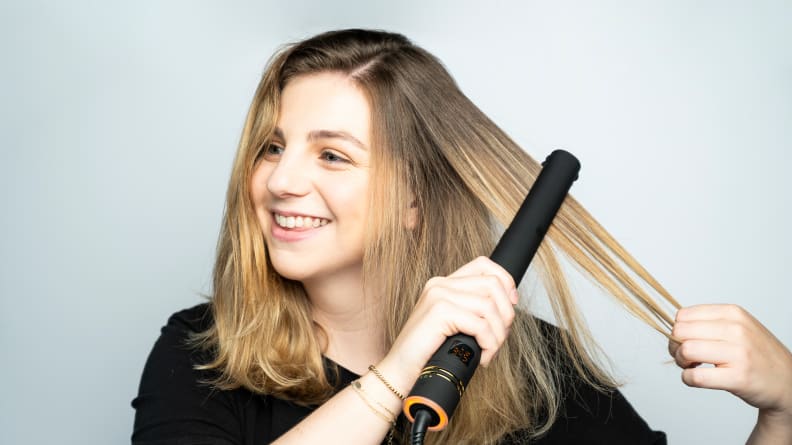

Our Best Overall pick from Hot Tools has intuitive buttons, a wide range of temperature settings, and an audible chime when it’s ready for use.
Above anything else, I want a hair straightener that smooths out my naturally wavy-curly, damaged hair with ease. I’ve used irons that appeared as though the plates weren’t fully touching when clamped around my hair, leaving me with flattened waves. I’ve also used some that straighten my hair just fine, but not without tugging at my strands or feeling gritty against them. Our Best Overall pick, however, does neither of these things. It moves through my hair with ease to create a sleek, frizz-free, and shiny ‘do.
The Hot Tools iron’s temperature settings ranges from 205°F to 455°F and increases by 10-degree increments. The instructions suggested turning the iron between 355°F and 405°F for wavy medium-thick hair, so I opted for the low end of that scale and got to work. It only took about 14 seconds for the iron to heat up and when I decided to bump up the temperature to 365°F halfway through, it signaled that it was ready within a few seconds.
Instead of using buttons to control the temperature, you rotate a swiveling wheel at the base of the straightener and watch the temperature adjust on the digital screen. I’ve never seen this mechanism before, but it adds to the iron’s sleek look and it’s super easy to use—and as the dial has a slight resistance, you won’t accidentally turn it up or down.
Aside from looking and feeling like a high quality styling tool, one of my favorite parts of this flat iron is how it alerts you with a loud beep when it arrives at your chosen temperature. It’s a simple feature, but it elevated my experience with the iron, and plenty of styling tools make you guess when they’re ready for use. My other favorite part? The plates are 4.25 inches long to tackle larger swaths of hair at once—our Best Value pick is the only straightener to upstage this at 4.5 inches long.
Another great feature is the nine-foot-long cord this iron has, which is one of the longest ones of all the irons we tested and helps guarantee that you’ll have an outlet close enough to use this at your vanity, or wherever you typically sit for styling. This flat iron also comes with a glove, which is a great addition to prevent burns on your nondominant hand as you guide the hair into the straightener.
As an added bonus, the Hot Tools flat iron has rounded edges that, when the iron is clamped, can be used for curling hair, too—the barrel can create curved ends or even loose curls for those who have mastered using a straightener for that.
Pros
-
Chimes when ready
-
Durable
-
Wide range of temperature settings
Cons
-
None that we could find
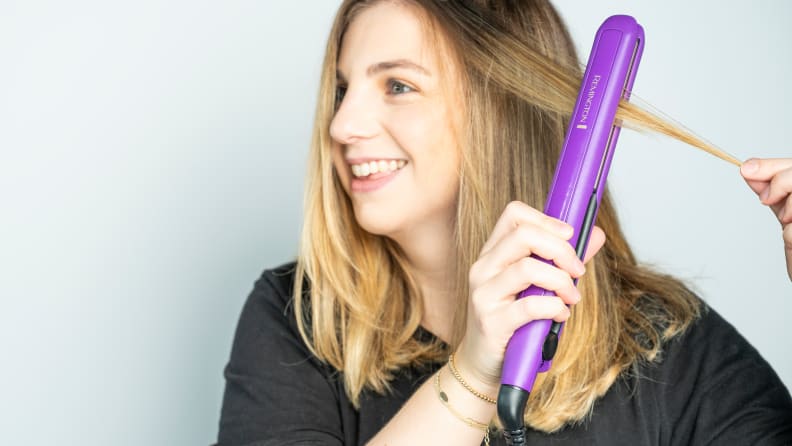

Our Best Value pick from Remington is a bargain flat iron with extra-long plates that results in a salon-quality smooth style.
This Remington straightener took our Best Value spot in our previous round of testing and continues to reign. It has a bargain price but it rivals expensive models in its performance. The iron has glossy, extra-long (4.5-inch) plates that smooth out the hair in no time with ease. Like the Hot Tools, this iron has a digital screen for visual confirmation that it’s on the setting you want, displaying bars that flash as it’s heating up then remain steady once it's reached the selected temperature. One con is that there’s no notification sound when the iron is ready—you have to watch the screen—but I found it heats up in 45 seconds, which is about average for a flat iron. The temperature settings increase in increments of 20°F, rather than the 10°F increments you get with the Hot Tools. Though, 10 to 20 degrees at those temperatures may not matter much to your hair. Additionally, the iron feels cheaper due to its plastic exterior and lightweight build. The cord is also only six feet long, which isn’t bad, but doesn’t grant you the same maneuverability as appliances with longer tethers, like the Hot Tools. Nonetheless, it’s still a great pick that’ll give smooth results. -->
How We Tested
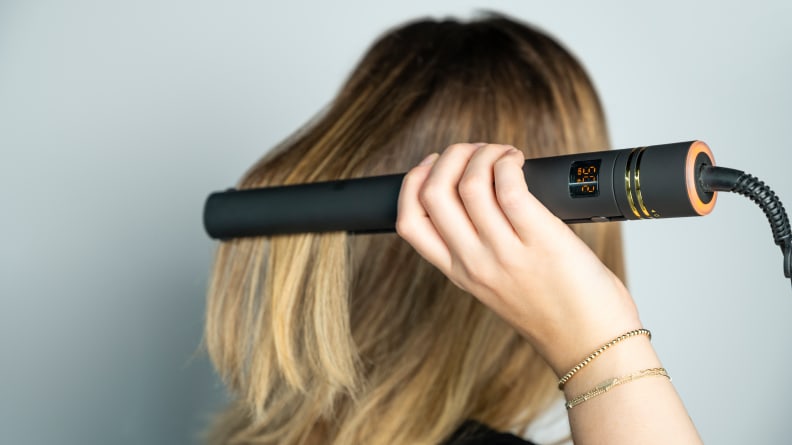
We found top-rated flat irons with thousands or reviews and pitted them against each other during testing.
The Tester
Hi, I'm Jessica, the lifestyle writer and resident beauty expert at Reviewed. I’ve been straightening my hair for approximately 10 years—and even longer than that, if you count the phase where my mom gave me blowouts that looked like a flat iron had set my tresses straight. The habit started in middle school when my wavy-straight hair formed into a more concrete curl pattern that I decided wasn’t up to snuff with the style norms of my classmates. And while I do wear my hair in its now wavy-curly natural state often, I blowdry and straighten my hair once a week and keep it for a few days before washing and styling it curly.
When I was in my peak flat-iron days in high school, I sat for about two hours start to finish on a Sunday night and blow dried and straightened my hair for the start of the school week (if only I could get those hours back!), a two-step process that I’ve since replaced with 20 minutes of using the Revlon One-Step Hair Dryer and Volumizer—a star among straightener brushes. But for flat iron testing, I purposefully avoided styling my medium-textured hair with the Revlon blow dryer and only used it to dry my strands, so I could see what these straighteners really had to offer.
Prior to this round of testing, Reviewed’s former beauty and health editor, Jessica Teich, wielded the irons on her own mane, which she describes as “thick, curly hair that I’ve been taming since I could hold a brush.”
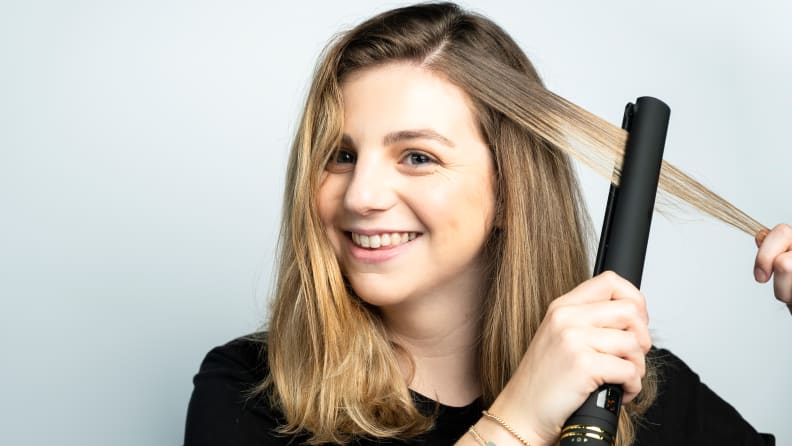
Before purchasing a flat iron, consider its heat settings first and foremost.
The Tests
Finding a great flat iron can be a daunting task. There are thousands for sale, varying sizes and claims, and hundreds of brands. We carefully analyzed the market and narrowed our findings down to the most popular flat irons out there. We pitted the best against the best at all prices.
I ran each straightener through my hair in the same way I’ve done for years post-shower and blowdry and attempted to achieve my desired style. I also added heat protectant to prevent further damage to my bleached hair. I took photos and notes that detailed how well and how easily I could get the sleek, straight hair I wanted with that iron.
I then answered questions about:
Heat: How many heat settings does the iron have? How specific can you get with the temperature? How long did each straightener take to heat up? Does it alert you when it’s heated?
Buttons: Are the buttons intuitive? Are the buttons in the way or at risk of being hit during styling?
Build: How durable does the iron feel? How comfortable is it to hold and style with?
Experience: How was the overall experience with the flat iron? Did it give your hair the desired results?
When I completed my portion of testing, I handed the flat irons off to Reviewed’s senior scientist, Julia MacDougall, who took temperature readings of a sampling of irons on the lowest, middle, and highest heat settings to test for accuracy. Several irons claimed to heat to pizza-baking temperatures of as high as 455°F, which is unnecessary for your hair—but if companies claim it, we test it.
What You Should Know About Flat Irons
Titanium vs. Ceramic Plates
Flat irons have either ceramic or titanium plates, which may not mean anything to you, unless you’ve had a positive experience with one or the other and now prefer one. Titanium flat irons are thought to be better for thicker, coarser hair because they transfer more heat faster and provide negative ions to the hair to neutralize any frizz that comes with texture, while ceramic plates are better for thinner, fragile hair because they evenly distribute the heat throughout your strands to prevent damage. Medium or textured hair can use either, but these are only suggestions and you can use either. For us, the type of plates had no bearing on what we chose to test or how we scored each iron during testing.
What to Consider Before Buying
When you want to purchase a flat iron, you should not only think about your hair’s texture and density, but how you typically use a straightener. If you don’t have much time for styling and want something that’ll go through your hair quicker, you may want an iron with a larger surface area, which means the plates will be longer (our Best Overall has 4.25-inch plates) and wider (most of the appliances we tested had one-inch wide plates, but many companies make straighteners in up to 2-inch widths). You also want to think about where your nearest outlet is when you style your hair and choose a flat iron with a cord length that’s long enough. (Cords range from six to 11 feet on models in our test.) If you travel a lot, you’ll want one with a sturdy but compact for easier packing. And most of all, you want one that fits comfortably in your hand and is intuitive enough for you to use without even having to look at the instructions. Each flat iron on this list was examined for each of these features in our testing.
How to find the right temperature for your hair
Heat, of course, is the most important element of a straightener, and not all of the tools let you set the temperature to a specific degree. In my ideal world, all irons would use buttons to increase the temperature by only about 10 degrees for more precision without overkill (I don’t need to have control over single digits, but I’d like the choice to bump my straightener up or down by small increments). Some of the irons on this list use dials instead of buttons, so you have to leaf through the booklet to find out what temperature corresponds with each setting on the dial. In an even worse case, one of the irons has settings “1” through “5” with temperature ranges of 40 degrees for each setting, which allows even less temperature flexibility.
What we found is that the irons easily reached their lowest settings, in the 200°F range, but then shot past those, meaning your hair may be exposed to more heat than what you intend. However, the readings were accurate at the middle ranges around 330°F, and none of the irons we heat tested reached the maximum of 450°F. What we learned from this is that you should take the temperature value with a grain of salt and plan to read the instruction booklet to find out what the company recommends for your hair type. For example, I use the mid-range heat settings on my medium hair, but someone with very fragile hair should start way lower.
You should also start at a temperature lower than what you think you may need and then go up from there if you find that it’s not hot enough to straighten your hair to your satisfaction. If you start at a lower temperature and have to hold the iron to your hair for longer than, say, 10 seconds, you should bump up to the next temperature, as less time under the heat is better for your hair in the long run.
Other Flat Irons and Hair Straighteners We Tested
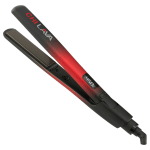
Despite being a great choice for smoothing out your locks, the Chi didn’t earn the top slot because it does not audibly alert you when heated up (it shows you the temperature rising on the display screen instead) and it costs more than the Hot Tools, which has all of the best features of this iron plus it heats up faster and chimes when it's ready for use.
The Chi Lava’s features are on par with the Hot Tools, with its smooth, four-inch plates that heat up in about 39 seconds. Also like our Best Overall pick, the straightener increases in 10-degree increments, ranging from 200°F to 450°F. Its only edge, if you need it, is its mega-long 11-foot cord, which stretches two feet beyond the Hot Tools.
If you’re loyal to Chi as a brand, prefer an iron that doesn’t beep, or want a really long cord for extra flexibility, you’ll be perfectly happy with this pick.
Pros
-
Durable
-
Wide range of heat settings
-
Smooth plates
Cons
-
No chime when it's ready
-
Expensive

The T3 SinglePass is a great pick that I enjoyed overall during testing, but it fell flat in certain areas. My biggest criticism is that the heat settings are labelled as “1” through “5” instead of the exact temperature they are, and you can only jump from one heat up to the next. For example, setting 1 is 260°F, 2 is 300°F, and it goes up by 40 degrees each notch until it reaches 410°F at setting 5. This temperature scale and mechanism seems arbitrary and allows little nuance.
I have medium-textured hair (but a lot of it, as a stylist once told me), so I opted for setting three, with help from the instructions. Despite my qualms with the mechanism of this iron, it was very easy to use and feels like it’s great quality. My hair came out as smooth as it did with the top irons on this list, likely thanks to the glossy plates.
I was skeptical that I’d enjoy the outcome of this iron, as the 3.5-inch plates are smaller than our Best Overall and Best Value picks, but the slickness of the ceramic plates turned out to be more important than the size, especially because I could take smaller sections to adjust to the plates’ surface area.
I wouldn’t recommend this iron, especially because it’s almost double the price of our Best Overall, but when push came to shove, it gave me the results I wanted.
Pros
-
Beautiful design
Cons
-
Confusing heat settings


Previously our Best Overall winner as chosen by our former beauty editor, Jessica Teich, the Paul Mitchell Neuro Smooth heats up in approximately 37 seconds (an average time) and alerts you with a beep when ready. This iron has 1.25-inch plates (this is the only one we tested that’s wider than 1 inch), which Teich loved for her long hair because it covered more surface area at once. “The plates hold hair firmly and smoothly without ever snagging, resulting in a nice, sleek style,” she writes.
My experience slightly varied from Teich’s—straightening my hair usually takes away density, but this iron managed to flatten my hair while still leaving the puffy feeling that my naturally wavy hair has. That said, I appreciated that the iron displays the temperatures (which range up to 450°F), along with “fine,” “medium,” or “thick” for clarity on which to select for your hair type.
I wouldn’t recommend this flat iron because it made my hair look good but not feel good, which equally matters to me. It’s also pricier than our top pick. Despite my experience, I’m not surprised to learn that others love it, as everyone has different hair types and goals, and you may find it works great for your hair.
Pros
-
Wide plates
-
Chimes when ready
Cons
-
Expensive

At a much lower price than most of the hair straighteners we tested, the InfinitiPro by Conair is a decent pick that anyone can use. It’s lower on this list, though, because it didn’t wow me, and our Best Value is even more affordable.
Rather than labeling temperature settings in degrees, this iron uses a numbered dial to control the heat, increasing by increments of five from 1 to 30. It claims that settings 1 through 8 are for fine hair and range from 338°F to 356°F, 9 through 14 are for medium hair and range from 357°F to 374°F, and so on until it reaches its maximum at 455°F. Like the T3 iron, this seems overly complicated and I’d much prefer buttons that turn the temperature up and down to a specific degree.
Where this iron gained points from me was its notification of when the iron is at the designated temperature. A red light pops on once you turn on the iron and goes out only if the temperature decreases below what you set it to. It then turns back to solid red when the iron is reheated. The visual cue that lets you know when the iron is on could be helpful if you often forget to unplug your hair tools.
Pros
-
Lights up when ready
-
Affordable
Cons
-
Not intuitive

To say that I am disappointed in the Dyson Corrale is an understatement. For a cost of about five times of our Best Overall flat iron, I expected my hair to straighten itself! The pros are that the Dyson is a cordless flat iron with a charger and holder in one, and it has a locking feature to keep it clamped when not in use and comes with a heat-proof pouch to slip the locked iron into. Having a cordless iron allows you to maneuver through your styling routine at ease and when you’re done, I like that you can lock the iron and pack it away into its heat resistant pouch for easy storage.
Dyson claims that the Corrale uses less heat on your hair, resulting in half the heat damage, because of its “flex plates” that corral the hair and shape around it to apply more even tension and heat to all strands. The idea is that it takes out the need to go over the same strands multiple times because this iron can do it in one swoop, and all you need is to pick the temperature that corresponds best with your hair: 330°F for fine, 365°F for medium, and 410°F for thick hair.
In my experience working with the 365°F setting, this iron did not give me sleek, smooth hair in just one swipe. I went over all sections of hair multiple times, gathering the normal amount of hair I would use in a flat iron but dropping some strands because the Dyson plates, at 3.5 inches, aren’t very long. And while advertisements show the plates forming around the hair, I saw none of that, though I’m not sure if I was supposed to or if that was just for visual clarification in the ads.
I wouldn’t spend this much on a flat iron, especially not one that doesn’t drastically improve your routine—and I don’t think you should, either.
Pros
-
Cordless
-
Durable
Cons
-
Expensive
-
Heavy
-
Uncomfortable to hold

Bio Ionic makes our favorite hair dryer, so we had high hopes for its hair straightener. However, I didn’t test the OnePass Straightening Iron for this round because it didn’t rise to the top of Teich’s list after previous testing.
The iron, which is adjustable up to 400 degrees and blinks a steady red light when heated up, was awkward to use. “This iron has plates with ‘silicone speed strips to provide faster straightening and increased shine,’ but this strange feature actually makes it feel like you’re straightening your hair in a humid room,” Teich writes. “ It’s not great for smoothing curly or wavy hair because the grip is so tight from the silicone strips, but that may make it ideal for pulling tough-to-style hair pin-straight.”
Teich also reported that you can adjust the temperature using a wheel at the end of the iron, but “it’s difficult to see once the iron is up to temperature and ready to use.”
Pros
-
Heats up quickly
Cons
-
Not great for smoothing curly or wavy hair
-
Not comfortable to use

There’s nothing wrong with the results that the BaByliss Pro Nano gives the hair. In fact, I remember coveting my friend’s when she had this exact model in high school. However, it has the same bothersome features as others ranked lower on this list: a dial that forces you to whip out the instructions just to know which setting of the 10 is right for your hair (the numbers go up to 50 but by increments of five and I chose 25 for “normal textured hair” per the instructions), and a price that’s above our Best Overall.
This iron also feels very lightweight and almost too thin, like it doesn’t fill your hand when you hold it. I didn’t mind that too much, as it has long plates (five inches) despite the smaller build, but I wasn’t as impressed with my final style as I was in high school. The bottom line is that more affordable irons can do the job just as well, if not better.
Pros
-
Lightweight
Cons
-
Flimsy-feeling
-
Not intuitiv
-
Expensive
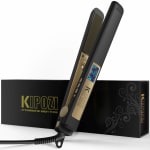
This iron isn’t anything special and it’s a bit heavier and larger in my hand than I prefer, though not as clunky as the Dyson. There’s a digital screen that displays the temperature as it heats up, but there’s no audible alert when the iron is ready. I like that it gives you a specific temperature, unlike the dial method on other irons, but it wasn’t very comfortable to hold and it doesn’t give the same sleek results as our Best Value despite costing more.
Pros
-
Intuitive
Cons
-
Heavy
-
Large
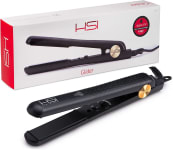
The HSI flat iron topped the list of other editorial sites’ recommendations, but it came in dead last on this list. This straightener uses the dreaded dial mechanism for changing the temperature, but it only shows the lowest (140°F) and highest (450°F) settings on the wheel, so you’re completely in the dark about the temperature you’re using other than that, apart from channeling your middle-school geometry skills. For me, this meant spinning the wheel to the center and guessing it is somewhere in the early 300s. The one redeeming factor related to its heat settings is that there’s a red light that turns green when the iron is on … whatever setting it’s on. What’s more, this iron takes too long—I spent about 10 extra minutes working with this one—to achieve results that were just fine. Skip!
Pros
-
None that we could find
Cons
-
Not intuitive
-
Takes a long time
